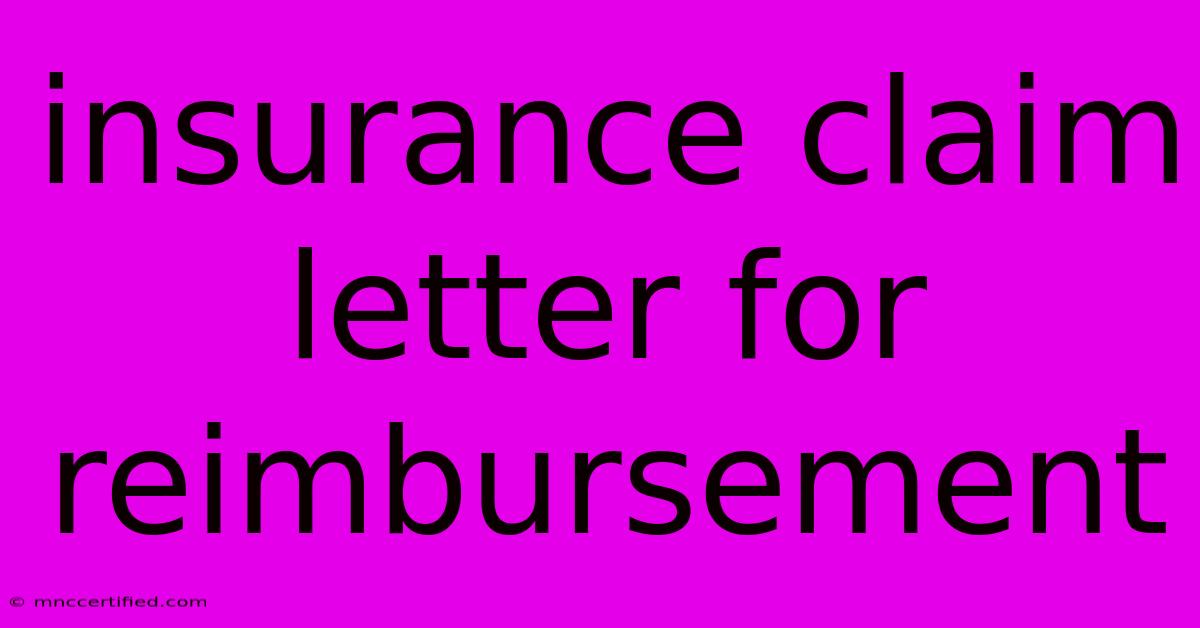Insurance Claim Letter For Reimbursement

Table of Contents
How to Write an Insurance Claim Letter for Reimbursement: A Step-by-Step Guide
Filing an insurance claim for reimbursement can feel like a daunting task, but it doesn't have to be. With a well-written letter, you can clearly communicate your request and increase your chances of a smooth and successful process.
This guide will walk you through the essential elements of an effective insurance claim letter, empowering you to confidently seek reimbursement for your covered expenses.
Understanding the Purpose of a Claim Letter
Your insurance claim letter serves as your official request for reimbursement from your insurance company. It provides a detailed account of the covered incident, the incurred expenses, and the specific coverage you're claiming.
Essential Elements of a Claim Letter
Here's a breakdown of the critical components to include in your claim letter:
-
Your Information: Begin with your name, address, phone number, and policy number. Ensure accuracy to facilitate prompt processing of your claim.
-
Date: Include the current date for documentation purposes.
-
Insurance Company Name and Address: Clearly state the name and address of your insurance company to avoid any confusion.
-
Subject Line: Use a concise and descriptive subject line, such as "Insurance Claim for [Incident Type]" or "Reimbursement Request for [Date of Incident]."
-
Salutation: Address the letter formally with "Dear [Claim Department/Insurance Agent Name]."
-
Body Paragraphs:
- Incident Description: Provide a clear and concise account of the incident that led to your claim. Include the date, time, and location of the event.
- Covered Expenses: List all expenses you are seeking reimbursement for, including specific details like date of purchase, vendor, and item description.
- Policy Coverage: State the specific coverage you are claiming under your policy. If possible, reference the relevant policy clauses or sections.
-
Supporting Documents: Attach copies of all necessary supporting documents, such as receipts, medical bills, repair estimates, and police reports.
-
Contact Information: Provide your contact information again for easy communication during the claim process.
-
Signature: Sign your name and print your full name below the signature.
Sample Insurance Claim Letter
[Your Name] [Your Address] [Your Phone Number] [Your Policy Number]
[Date]
[Insurance Company Name] [Insurance Company Address]
Subject: Insurance Claim for [Incident Type]
Dear [Claim Department/Insurance Agent Name],
This letter is to formally file an insurance claim for [Incident Type] that occurred on [Date] at [Time] in [Location].
[Briefly describe the incident and its cause.]
As a result of this incident, I have incurred the following expenses:
- [Expense 1]: [Date], [Vendor], [Description], [Amount]
- [Expense 2]: [Date], [Vendor], [Description], [Amount]
- [Expense 3]: [Date], [Vendor], [Description], [Amount]
I am claiming reimbursement for these expenses under my policy's [Coverage Name] coverage. [Optional: Briefly mention relevant policy clause/section number if applicable].
I have attached copies of all supporting documentation, including [List the supporting documents you are attaching].
Please feel free to contact me at [Your Phone Number] or [Your Email Address] if you require any further information.
Sincerely,
[Your Signature] [Your Printed Name]
Tips for Writing an Effective Claim Letter
- Be Clear and Concise: Use plain language and avoid technical jargon.
- Proofread Carefully: Ensure your letter is free of errors in grammar and spelling.
- Keep a Copy for Your Records: Make a copy of the letter and all supporting documents for your reference.
- Follow Up: If you don't receive a response within a reasonable timeframe, contact your insurance company to inquire about the status of your claim.
Final Thoughts
A well-structured and informative insurance claim letter can streamline the reimbursement process. By following these steps, you can ensure your request is clearly presented and increase your chances of a successful outcome. Remember to keep your records organized and follow up with your insurance company as needed.

Thank you for visiting our website wich cover about Insurance Claim Letter For Reimbursement. We hope the information provided has been useful to you. Feel free to contact us if you have any questions or need further assistance. See you next time and dont miss to bookmark.
Featured Posts
-
Does Dental Insurance Cover Wisdom Teeth
Nov 08, 2024
-
Reds Trio On Track For Comeback
Nov 08, 2024
-
Joao Felix Christopher Conference League Goals
Nov 08, 2024
-
Will Insurance Pay For A Condemned House
Nov 08, 2024
-
Eddie Redmayne A New Side Revealed
Nov 08, 2024